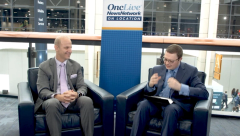
Dr Grivas on Key Updates in Genitourinary Cancer Management
Petros Grivas, MD, PhD, and Chandler H. Park, MD, FACP, discuss key updates in genitourinary cancer on OncLive News Network: On Location.
Episodes in this series

Petros Grivas, MD, PhD, professor, Clinical Research Division, Fred Hutch Cancer Center; professor, Division of Hematology and Oncology, clinical director, Genitourinary Cancers Program, University of Washington School of Medicine; and Chandler H. Park, MD, FACP, medical oncologist, Norton Healthcare; clinical assistant professor, University of Kentucky; medical school professor, University of Louisville School of Medicine; Kentucky medical oncologist representative, National Comprehensive Cancer Network®; Kentucky physician representative, State Executive Council, American Society of Clinical Oncology (ASCO), discuss key updates in genitourinary cancer management on
Looking to bladder cancer treatment, a recent press release gave insights concerning the phase 3 TROPiCS-04 trial (NCT04527991), Park states. Grivas explains that this investigation compared sacituzumab govitecan-hziy (Trodelvy), an antibody-drug conjugate, with taxane-based treatments in patients with metastatic or locally advanced unresectable urothelial cancer. This study aimed to confirm the results from a cohort of the phase 2 TROPHY-U-01 trial (NCT03547973), findings from which previously led to the accelerated approval of sacituzumab govitecan for patients with metastatic or locally advanced unresectable urothelial cancer who had progressed following platinum-based chemotherapy and checkpoint inhibitors, Grivas reports. Although the press release indicated no significant overall survival difference between sacituzumab govitecan and the comparator group, he says the complete data will help oncologists fully understand the nuances of these findings.
Additionally, the importance of growth factor support is stressed in the press release. In clinical practice, primary prophylaxis with growth factors is essential when using sacituzumab govitecan to reduce the risk of febrile neutropenia and maintain dose intensity, Grivas states. This underscores the critical role of growth factor support in managing neutropenia and maintaining treatment efficacy, Park adds.
Ongoing studies, such as a trial investigating neoadjuvant trastuzumab (Herceptin) in histologic subtypes of urothelial carcinoma, will provide further insights, he says. Ensuring the use of primary prophylactic growth factor support remains a cornerstone in these treatment protocols to optimize patient outcomes, Park concludes.
















































